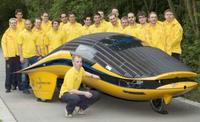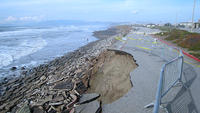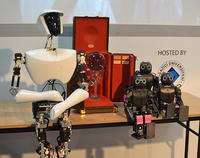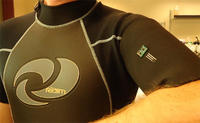-
Melting ice sheets release toxic pollutants outlawed in 2001
The melting of arctic ice sheets causes the rise in sea levels — but there is another danger: the melting causes dangerous chemicals, including the notoriously toxic DDT, to be freed from Arctic sea ice and snow; the chemical — known as “persistent organic pollutants” (POPs) — were widely used as insecticides and pesticides before being outlawed in 2001; they are extremely tough molecules that take decades to break down in nature; they also bio-accumulate, meaning that as they pass up the food chain, concentrations rise, posing a fertility threat to higher species
-
-
Students develop landmine detection robot
A team of Texas A&M University at Qatar students and faculty has developed a state—of-the-art landmine detection robot as part of the NI Mine Detection Robot Design Contest; The competition challenged engineering students in the Middle East to work toward solutions to the real-life landmine problem that the Arab region and other areas face in the aftermath of conflict
-
-
Tampa police already training for 2012 RNC convention
In preparation for next year’s Republican National Convention in Tampa Bay Florida, nearly every local police department employee is required to attend a three-day training course; the mandatory training is designed to teach officers how to control large crowds
-
-
Mathematical framework converts junk energy into useful power

Researchers have developed a mathematical framework that could one day form the basis of technologies that turn road vibrations, airport runway noise, and other “junk”energy into useful power;
-
-
Antibacterial stainless steel created
Materials scientists have devised a way of making stainless steel surfaces resistant to bacteria; by introducing silver or copper into the steel surface — rather than coating it on to the surface — the researchers have developed a technique that not only kills bacteria but is very hard and resistant to wear and tear during cleaning
-
-
Cambridge U team intends to win the 2011 World Solar Challenge

The World Solar Challenge, the “Formula One” of eco-friendly motorsport, consists of a 3,000 kilometer race across the Australian outback from Darwin to Adelaide; it will be held 16-23 October 2011; the University of Cambridge team believes it has a real chance to win with their newly designed Cambridge University Eco Racing (CUER) machine
-
-
Placement of wind-turbine increases power tenfold

The power output of wind farms can be increased by an order of magnitude — at least tenfold — simply by optimizing the placement of turbines on a given plot of land; rather than build taller towers and bigger blades, efficient wind-based energy production should focus on the design of the wind farm itself, to maximize its energy-collecting efficiency at heights closer to the ground
-
-
"Amplified" nanotubes for efficient, loss-free grid
The current U.S. copper-based grid leaks electricity at an estimated 5 percent per 100 miles of transmission; Rice University researchers have achieved a breakthrough in the development of a cable that will make an efficient electric grid of the future possible; the armchair quantum wire (AQW) will be a weave of metallic nanotubes that can carry electricity with negligible loss over long distances
-
-
Melting ice sheets chief cause of rising sea levels
There are two causes for rising sea levels — melting ice sheets and thermal expansion of warming ocean waters; during the Last Interglacial Period, the former contributed much more to rising sea levels than the latter, a University of Arizona-led team of researchers has found; the results further suggest that ocean levels continue to rise long after warming of the atmosphere levels off
-
-
U.S. West Coast is rapidly eroding, with pace to accelerate

The stormy conditions of the 2009-10 El Nino winter eroded beaches from San Diego to Seattle to often unprecedented levels; the higher sea levels expected due to global warming, and potentially even stronger winter storms, will likely to contribute to increased rates of beach and bluff erosion along much of the U.S. West Coast
-
-
Understanding deadly tornadoes

Scientists at the University of Alabama in Huntsville (UAH) are analyzing radar data from 27 April 2011 — the day that saw of the deadliest tornado outbreaks in U.S. history — then merging the information with detailed storm surveys and other data; they hope to learn more about how the storms formed, what made the storms so powerful and what might be done to make tornado warnings more effective
-
-
Creating genetic replacement for oil
Scientists previously established that oil and coal have their roots in the organisms that lived on the planet over 500 million years ago, but researchers only are sure of one organism that directly contributed to these natural resources — that organism is the algae Botryococcus braunii; this algae is very slow growing, so it is not necessarily a good source for biofuels; scientists offer an alternative
-
-
Virginia Tech team dominates robot soccer World Cup competition

The Virginia Tech team dominated the international robot soccer competition known as RoboCup this past weekend, winning the Louis Vuitton Humanoid Cup, the competition’s version of the World Cup; the team also dominated with First Place in both the Adult Size class with the 5-foot humanoid robot CHARLI-2 and the Kid Size class with the miniature humanoid-robot DARwIn-OP
-
-
Sensors printed on wetsuits detect explosives, other hazards

UC Sand Diego researcher has successfully printed thick-film electrochemical sensors directly on flexible wetsuit material, paving the way for nano devices to detect underwater explosives or ocean contamination; UCSD has a full U.S. patent pending on the technology, and has begun talks on licensing the system to a Fortune 500 company
-
-
World's first cardboard vacuum cleaner unveiled

A U.K. vacuum cleaner manufacturer will market a high performance vacuum cleaner constructed out of recycled and recyclable materials; the device was designed by an industrial design student; the corrugated cardboard panels that form the body of the machine are easily replaced if damaged and cost just a tenth of the price of an equivalent plastic panel
-
More headlines
The long view
New Technology is Keeping the Skies Safe
DHS S&T Baggage, Cargo, and People Screening (BCP) Program develops state-of-the-art screening solutions to help secure airspace, communities, and borders
Factories First: Winning the Drone War Before It Starts
Wars are won by factories before they are won on the battlefield,Martin C. Feldmann writes, noting that the United States lacks the manufacturing depth for the coming drone age. Rectifying this situation “will take far more than procurement tweaks,” Feldmann writes. “It demands a national-level, wartime-scale industrial mobilization.”
How Artificial General Intelligence Could Affect the Rise and Fall of Nations
Visions for potential AGI futures: A new report from RAND aims to stimulate thinking among policymakers about possible impacts of the development of artificial general intelligence (AGI) on geopolitics and the world order.
Smaller Nuclear Reactors Spark Renewed Interest in a Once-Shunned Energy Source
In the past two years, half the states have taken action to promote nuclear power, from creating nuclear task forces to integrating nuclear into long-term energy plans.
Keeping the Lights on with Nuclear Waste: Radiochemistry Transforms Nuclear Waste into Strategic Materials
How UNLV radiochemistry is pioneering the future of energy in the Southwest by salvaging strategic materials from nuclear dumps –and making it safe.
Model Predicts Long-Term Effects of Nuclear Waste on Underground Disposal Systems
The simulations matched results from an underground lab experiment in Switzerland, suggesting modeling could be used to validate the safety of nuclear disposal sites.
